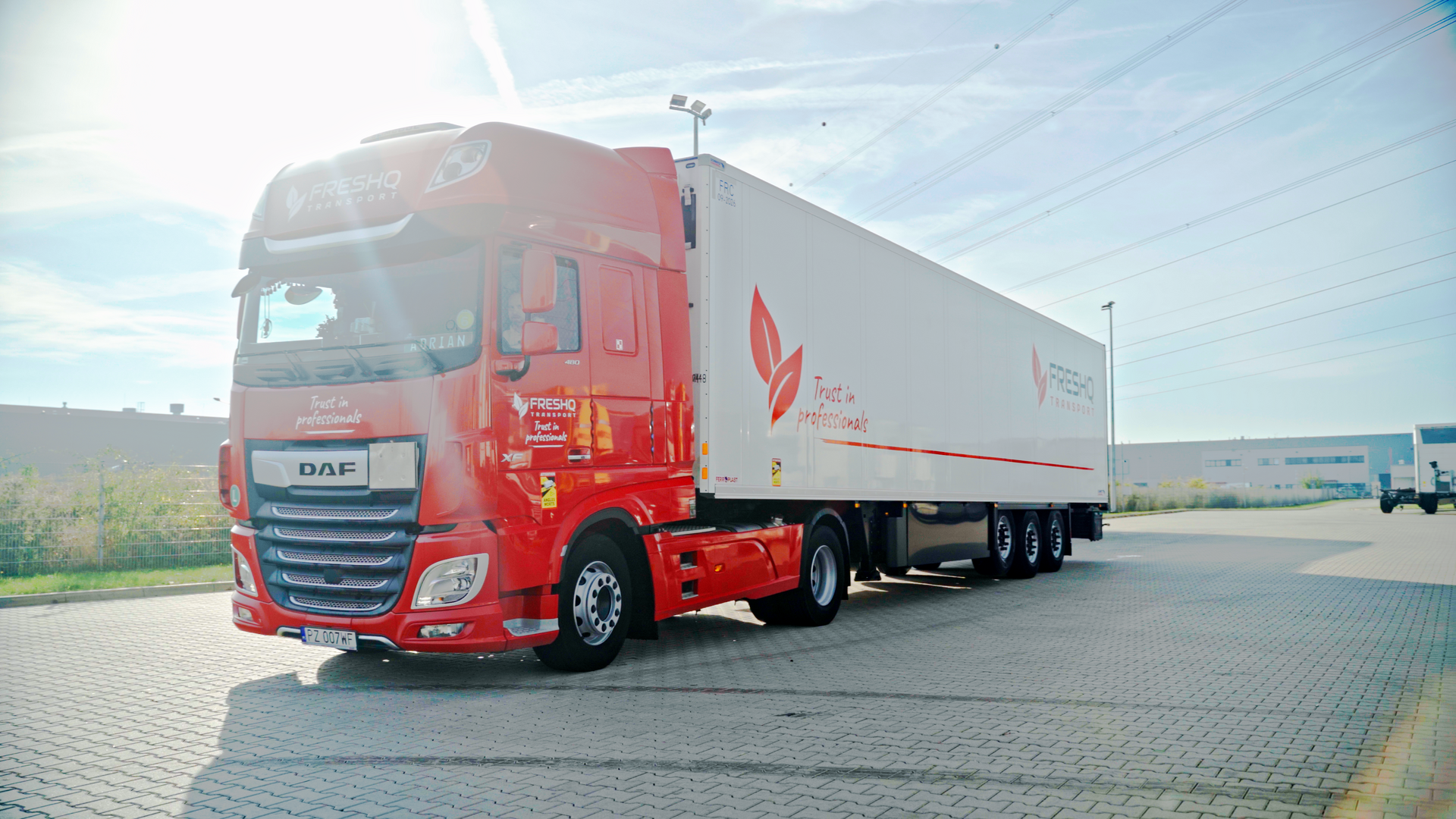The transport of food products that require controlled temperature places very high demands on the carrier's fleet. These are mainly fresh or perishable goods, therefore the safety of the product and maintaining its high quality during transport is a priority. In addition, there are very high requirements regarding the speed and timeliness of deliveries. The specificity of some goods requires the use of specialized types of semi-trailers for transport.
Types of refrigerated semi-trailers used in temperature controlled products transport
Standard refrigerated trailer – standard refrigerated bodies are based on aluminum panels, polyester-glass foil, often called laminate, and the insulator is a rigid polyurethane foam or polystyrene. Standard dimensions are internal width 245 cm, internal height 265 cm, internal length 1340 cm. The thickness of the walls in standard refrigerated semi-trailers is 65 mm or 85 mm in the case of reinforced walls. Such a body can be used for most goods in a wide range of temperatures, from -25C to +25C.
Refrigerated doppelstock / doubledeck trailers – body with the so-called double floor is mainly used to transport light, delicate products with low weight tolerance, which means that they cannot be restacked or stacked high. Thanks to the system of movable, lifted crossbeams attached to the body walls, it is possible to organize an additional cargo floor for storing goods during transport. This enables the simultaneous loading of up to 66 Euro pallets with a height not exceeding 130 cm. The main goods transported on this type of semi-trailers are sweets, food products and cosmetics.
Two-chamber refrigerated trailer – a semi-trailer equipped with a special, movable partition wall attached to the ceiling of the body interior, thanks to which it can simultaneously transport goods that require different temperatures. It has two independent refrigeration units with a wide range of temperatures, thanks to which it is possible to transport both frozen products (-25C / -1C) and goods at positive temperatures (+1C / +25C). The bulkhead wall provides very good insulation, thanks to which two extreme temperatures do not affect the loads transported separately. The weakness of this type of body is the lower than the standard loading space, which can accommodate goods with a height of about 240 cm, as well as the higher curb weight of the semi-trailer, which means that the maximum weight of the loaded goods is lower than in the case of a standard refrigerator.
Flower refrigerated trailer – flowers and potted plants are transported on special flower carts, the most popular of which are the so-called Danish trolleys (CC) or ECC trolleys. Flower semi-trailers are characterized by a wider loading space of 250 cm, thanks to which they are able to accommodate more flower trolleys than a standard refrigerator. Wider space is obtained at the expense of narrower side walls (45mm), which results in lower thermal insulation, which is why it is not recommended to transport goods requiring a transport temperature lower than 0C on this type of body.
Hook refrigerator trailer – a body dedicated to the transport of meat or half-carcasses on special hooks fixed in guides mounted in the ceiling. This body is characterized by a reinforced structure of the roof, side walls and front wall, which is to prevent damage when carrying a load that weighs heavily on the roof. Due to its construction, the hook semi-trailer has limitations as to the weight of the transported load and its height. After removing the transport hooks due to the guides and the thicker roof, the maximum load height is 240 cm, while the weight should not exceed 21 tons gross.
What trailers does FreshQ Transport use?
FreshQ Transport provides a modern fleet of 40 own refrigeration units consisting of MAN and DAF tractors equipped with new Schmitz trailers. Our fleet consists of 23 standard refrigerated semi-trailers and 17 refrigerated flower semi-trailers with the doppelstock system. All trucks are equipped with a modern telematics system that allows you to track the load at every stage of transport, as well as a Sanepid certificate, a veterinary permit and a full set of euro pallets for exchange.
In addition, a very extensive network of our subcontractors gives us possibility to work with over 300 refrigerated trucks, thanks to which we are able to provide our customers with daily availability of trucks in almost every European country.



